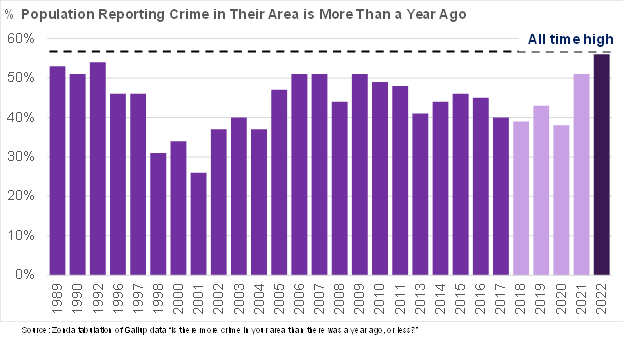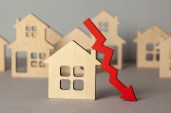An important story is unfolding: Households are moving to better neighborhoods with less crime. And the implications could be meaningful. Until recently, moving because of crime was a very predictable statistic. Changes from year to year were typically very small and had been going down to all-time lows in 2018. Then things reversed rapidly.
In 2021, moving due to crime surged, jumping roughly four times faster than the typical pace of change over the prior decade. That’s a shift from an all-time low to an all-time high within four years. Anytime a housing number swings within four years from an all-time low to an all-time high, you should pay attention.
What does the actual data show? According to FBI statistics, violent crime per capita has been declining for 30 years, to roughly half the levels of 1990. That incidentally is nearly the same magnitude of decline in mobility (although we are not claiming this is the only factor).

At the same time, the visibility and magnitude of crimes have gotten more concerning. Murder rates, which tend to get more media coverage, have increased to levels not seen since late 1990s, when move rates were ~35% more frequent than today.
People feel less safe and perceive more crime, and many are moving to neighborhoods they perceive as “better.” In 2022, Gallup reported a new all-time high in the percentage of population that perceives more crime “in their area” than before. We don’t have mobility data for 2022 yet, but the number will necessarily increase (not surprisingly).

Consider this: Homeowner mobility has been declining for the past ~40 years. The reasons for fewer moves as a society are varied, but the most compelling explanations are:
- Demographics, which explain about one-third of the decline in move rate;
- Less labor market dynamism—it’s risky to switch industries or move for a new opportunity (Note: I think this is changing now, but that’s a story for another day); and
- Too much comfort in our existing homes and communities. Some call this complacency. After all, moving is very disruptive and requires an adjustment to nearly every comfortable routine we have. As economist Tyler Cowen commented: “People generally don’t move unless they have to, or they are very serious about living through a lot of personal change.”
The surge in moving to avoid crime appears to be a reversal of No. 3 and could be a signal of a much more important underlying trend to an increased overall move rate in the future.
Why do we care? Small increases in the overall mobility rate drive enormous swings in home sales. Last year there were 5.7 million home sales, between resale and new homes. If mobility were at the same levels as 2000, that number likely would have been closer to 7.7 million—an increase of 2 million additional transactions. If mobility were the same as 1990, home sales likely would have been closer to 9 million. That’s 48% higher than 2022 levels.
My advice: Pay attention to all the things that make you “uncomfortable,” including crime. Keep a mental note of how often disquieting thoughts come up in conversation. If it seems like the frequency is increasing, remember the implication for housing: People move when they are serious about improving their circumstances.
Embrace the discomfort, because it just might be signaling a reversal of mobility to better (higher) numbers.



